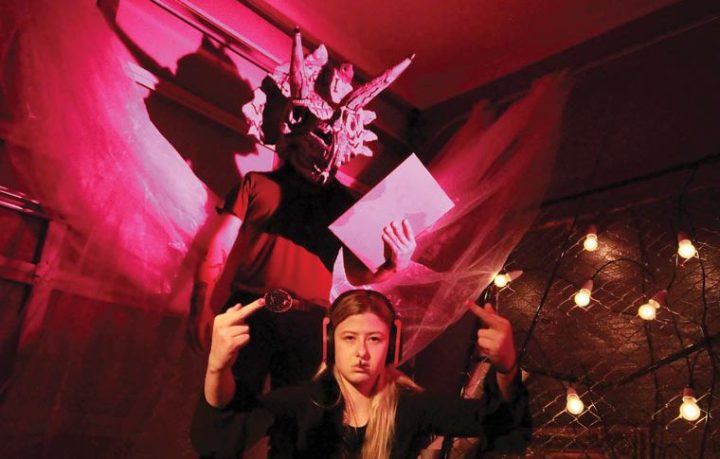The Book of Life
Review by Rhys Tarling
31.1.2017
Likely to captivate and infuriate in equal measure, writer/director Joe Lui‘s The Book of Life is admirable in its cleverness. But some will find its cleverness far too cute for its own good; that its all-encompassing cleverness trades fully formed characters for walking thesis statements, arguments, and lectures, and will leave the theatre feeling nonplussed. Others will find it clever and amusing, and will leave the theatre feeling charmed. However, I think everyone can agree that the set and costume design by Sally Phipps is superbly realised; she mix ‘n’ matches a range of influences (the result is a bit like hillbillies dipped in a vat of emo) to synthesise an atmosphere that’s unique and works in perfect tandem with the gothic rock music composed by Joe Lui and Brett Smith.
My feelings toward The Book of Life are murky. It goes for high camp, thudding self-seriousness, and surreal absurdism with such ecstatic abandon that it’s difficult to embrace but easy to appreciate at arm’s length. It’s interesting to unpack, though.
The Book of Life begins with 15 year old Lily’s (Morgan Owen) suicide and the rest chronicles her strange odyssey through the afterlife. On her travels she encounters a plethora of creatures (Nicola Bartlett, Paul Grabovac, and Indigo Keane) who help her appreciate the miraculous nature of existence; who help her appreciate that she’s part of some great continuum that stretches back millennia – the significance and beauty and ugliness of which is beyond one person’s comprehension. All of which is sort of blackly comic considering she’s a dead child. Her guide through the afterlife is Charon (Jo Morris), a spirit whose job it is to ferry souls from life to the afterlife. The whole affair is narrated by what might be God (Nick Pages-Oliver) and his band of rockstar pirate-looking musicians.
The Narrator and his rockstar pirate-looking musicians are the perpetrators of The Book of Life‘s polarising effect. At first they’re merely a sort of Greek chorus commenting on the actions and themes of the play with a Southern rock twang and sometimes stroking the fourth wall that separates the story and the audience. But by the third act they ditch the stroking for a sledgehammer, snickering and sneering at the resulting dust and broken bricks. And if you’re watching this play feeling not so great about where you’re at in life, you might feel like they’re hurling the broken bricks at your face. At a certain point I inwardly muttered to myself “try not to take it personally, it’s a goddamn play.” It definitely achieved the Brechtian effect of startling me out of a certain complacency, at least for a couple of minutes. Bluntly put, its meta-ness is so brazen that it will most certainly leave your mouth agape. Whether you find that appealing or not is a matter of taste. It’s certainly a bold gambit.
But much of the play centres on Jo Morris‘s spiritual guide Charon and Lily exchanging barbs and lessons learned and secret hopes. They make a terrific odd couple; Jo Morris’s dramatic flourishes and Morgan Owen‘s down to earth scepticism clashing makes for some of the play’s funniest comedy. Even the sight of them side-by-side, Morris’s ghoulish Addams Family creepiness and Owen’s Laura Palmer-esque good looks, suggests something interesting.
When The Book of Life is not trying to punch you in the face with Profundity and Truth, it’s startling, unique, and creative. Still, even when it leaves subtlety in the dust, I couldn’t help but admire the speed and abandon with which it did so. It’s something to see.
The Book of Life runs until February 4 at the Studio Underground at the State Theatre Centre. For more information and tickets, visit The Blue Room website here, or the Fringe World website here.
RHYS TARLING

